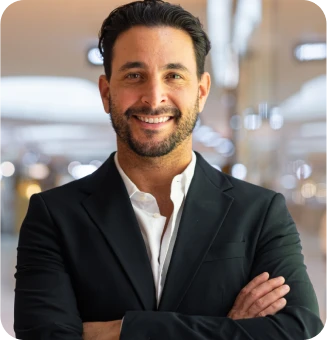Every year, more than 20 million patients travel abroad to seek advanced treatments.
As a referral partner, you can capture your slice of this $100 billion market via online channels and in-person outreach.
This guide reveals 7 proven strategies to help you connect with patients who are actively researching treatment options.
You’ll learn how to engage social-media communities, identify online healthcare listings, deliver good educational content and build trust through one-on-one engagements.
Online Strategies for Finding Patient Leads
Over 50% of patients begin their healthcare journey online, researching treatments, seeking advice, and comparing options.
A visible, helpful presence on social media and search lets you connect with those seeking care abroad.

1. Leverage Social Media and Patient Communities
Why it works: Platforms like Facebook, host communities with conditions such as heart disease, cancer, diabetes, joint surgery.
Patients share experiences and seek advice there, a good option for leads who are already exploring treatment options overseas.
How to engage:
- Identify Facebook groups communities related to the treatments or conditions you would like to refer and join these groups.
- Engage by answering questions, sharing useful information about treatment options abroad, and posting supportive comments, you may share My 1Health articles about advanced treatments available overseas or explain how international hospitals handle a procedure.
- Patients trust real stories and reviews before making decisions. When suitable, gently share success stories or testimonials from My 1Health’s case studies or past clients you have referred.

2. Create Educational Content
Why it works: When people face serious medical conditions, they first search online for answers.
At least 60% of patients search online for a hospital or specialist, creating useful, informative content can help attract them to you.
Good content builds trust: if someone reads a helpful social media post you wrote about, say, “How to Find a Good Hospital for Cancer Treatment in India,” they’re more likely to consider contacting you for help.
How to engage:
- Social-Media Mini-Guides
Turn a FAQ or short checklist into a carousel post on Instagram or Facebook. Example: “5 Steps to Prepare for Medical Travel” with one slide per step. - Short-Form Video
Record 60 – 90 second “how-to” clips for Facebook, X, Instagram Reels, YouTube Shorts or TikTok. Topics like packing tips, visa reminders, or “3 things I wish I’d known before my liver transplant in Turkey.” - Live Q&A Sessions
Host a weekly or monthly live on Facebook, TikTok or Instagram. Invite followers to ask questions about treatment costs, hospital selection, or travel arrangement. - Downloadable Resources via Messaging Apps
Create a one-page PDF (e.g., “Top 5 Questions to Ask Your Overseas Surgeon”) and share it in WhatsApp or Telegram groups.
Tip: Try to post new content regularly (2x a week), it keeps you visible. Over time, as patients repeatedly come across your helpful content, you’ll be the one they think of when they need to go for treatment abroad.

3. Utilise Targeted Online Advertising and Listings
Why it works: Online advertising allows you to reach exactly the people who might need your help. Platforms like Google and Facebook offer targeted ads so you can focus on users by location, interests, or search behaviour.
For example, you could show an ad about “Affordable Hip Replacements in Turkey” to people in your city who have been reading about hip pain or joint surgery.
This will attract potential patients who may not know referral partners like you exist to help them. Used wisely, paid ads can quickly connect you with high-intent leads who are already seeking treatment solutions.
How to engage:
- First, decide which social media channel to use. If you suspect many of your potential clients are on Facebook (perhaps middle-aged adults researching health options for their parents), Facebook ads could be effective.
- Register on popular healthcare listings or expat forums where medical travel is discussed.
- Track your results to refine your approach to understand where the real demand is for genuine and quality leads.

4. Encourage Online Testimonials and Referrals
Why it works: A genuine recommendation or story from a fellow patient can carry more weight than any polished brochure.
Many patients search the internet for reviews or testimonials before deciding on a doctor or hospital.
For example, someone might ask in a Facebook group, “Has anyone gone abroad for surgery? Any advice?” If a past patient you helped responds and tags you (“@YourName helped me arrange my surgery in India and it went great!”), that’s a powerful endorsement.
How to engage:
- Cultivate your online reputation. Ask satisfied patients if they would be comfortable sharing their experience on your social media page or provide a testimonial.
Offline Strategies for Finding Patient Leads
While online efforts cast a wide net, never underestimate the power of offline, face-to-face connections.
Healthcare is personal, and many high-quality leads emerge from real-world trust and community presence.
In fact, even in the digital era, 84% of patients use both online and offline sources when researching health options.
Here are key offline strategies to tap into your local community and find those who need care abroad.
I. Engage in Community Health Events and Support Groups
Why it works: Wherever people gather to talk about health, there’s an opportunity to find those in need of advanced care.
Community events put you in direct contact with potential patients and their families in a context that's about learning and support.
How to engage:
- Look out for upcoming health-related events in your community like Cancer Survivors Day, diabetes awareness workshops, or wellness events for older people.
- Stall or Booth: Set up a simple booth with a clear sign (e.g., “Overseas Medical Treatment Guidance – ask us how we can help”).
- Workshops or Talks: Offer to give presentations and talks on healthcare events. For example, at a kidney health event, you could present “Best Hospitals for Kidney Transplant Abroad: What to Know”. Ensure your talk is educational – discuss costs, process, and success stories.
- Patient Support Groups: Politely approach group leaders to see if you can attend or speak at a meeting. Emphasise that you’d like to provide information that could benefit members.
Tip: When attending events, collect contact information (with permission) for follow-up. If someone shows interest or asks a lot of questions, offer to stay in touch.
II. Leverage Local Media and Public Awareness
Why it works: Local newspapers, radio shows, and TV programs remain powerful in many communities – especially for reaching older adults or those who aren’t always online.
Such media appearances give people useful information with the advantage being that people already pay attention to TV and Radio.
Traditional media often reaches family members and caregivers who might be the ones researching options for a loved one.
How to engage: Consider various media outlets in your area:
- Local Radio: Reach out to radio stations that have health or community talk shows.
- Local Newspapers or Magazines: Contact a health or lifestyle reporter and pitch a compelling health story. Alternatively, offer to write a guest article with advice on medical travel.
- TV and Community Channels: If there’s a community TV channel or a show like “health talk” on the news, propose to be featured within it.
Tip: When dealing with the media, focus on education, not promotion. If you provide genuine value (statistics, stories, tips), you’re more likely to be featured and to engage the audience.

III. Harness Word-of-Mouth and Personal Referrals
Why it works: Word-of-mouth is perhaps the oldest and most trusted form of marketing – and it’s extremely potent in healthcare.
When someone needs a serious surgery, they will likely ask friends, family, or their local doctor for advice, thus a personal recommendation cuts through a lot of doubt.
If a former client sings your praises to their neighbour, or a community leader mentions your service in conversation, the person in need is far more likely to reach out.
How to engage:
- Keep in touch with past patients; a simple follow-up call or message to check on their recovery goes a long way. When appropriate, let them know you appreciate any referrals.
- Community networking, utilise your relationships with local influencers – not just doctors, but community leaders, religious leaders, or social workers who come across sick individuals.
Tip: Handle each question and inquiry with care and keep it patient-centred. Confidentiality and integrity are key to ensuring a spotless reputation as a My 1Health referral partner.




